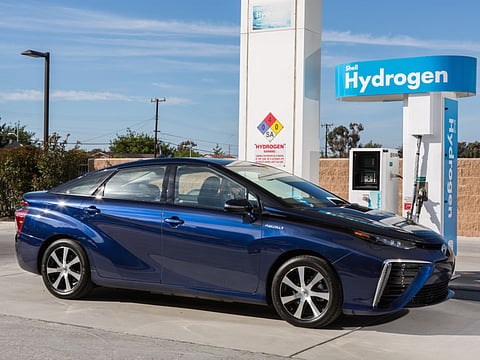Hydrogen can help achieve carbon emission reduction targets
World Hydrogen Council launches new study

Dubai: Hydrogen can help achieve 20 per cent reduction in the carbon emissions target of 2050, a latest study on the potential of the gas points out.
About 18 key industry leaders, part of the Hydrogen Council Coalition, launched the first ever globaly quantified vision on the role of hydrogen, in Bonn, Germany. The study entitled ‘Hydrogen scaling up’, developed with support from Mckinsey and Company, not only shows how hydrogen will be the key pillar in the energy transition but also indicates the potential of hydrogen to generate $2.5 trillion (Dh9.2 trillion) worth of business and help in creating 30 million jobs by 2050.
Deployed at scale, hydrogen could account for almost one-fifth of total final energy consumed by 2050. This would reduce annual CO2 emissions by roughly six gigatons compared to today’s levels, and contribute roughly 20 per cent of the abatement required to limit global warming to two degrees Celsius.
On the demand side, the Hydrogen Council sees the potential for hydrogen to power about 10 to 15 million cars and 500,000 trucks by 2030, with many uses in other sectors as well, such as industrial processes and feedstocks, building heating and power, and power generation and storage. Overall, the study predicts that the annual demand for hydrogen could increase tenfold by 2050 to almost 80 exajoules (EJ) in 2050, meeting 18 per cent of total final energy demand in the 2050 two-degree scenario. At a time when global populations are expected to grow by two billion people by 2050, hydrogen technologies have the potential to create opportunities for sustainable economic growth.
Takeshi Uchiyamada, chairman of Toyota Motor Corporation and co-chair of the Hydrogen Council said : “The world in the 21st century must transition to widespread low-carbon energy use. Hydrogen is an indispensable resource to achieve this transition because it can be used to store and transport wind, solar, and other renewable electricity to power transportation and many other things. The Hydrogen Council has identified seven roles for hydrogen, which is why we are encouraging governments and investors to give it a prominent role in their energy plans. The sooner we get the hydrogen economy going, the better, and we are all committed to making this a reality.”
Benoit Potier, Chairman and CEO of Air Liquide added: “This study confirms the place of hydrogen as a central pillar in the energy transition and encourages us in our support of its large-scale deployment. Hydrogen will be an unavoidable enabler for the energy transition in certain sectors and geographies. The sooner we make this happen, the sooner we will be able to enjoy the needed benefits of hydrogen at the service of our economies and our societies.”



